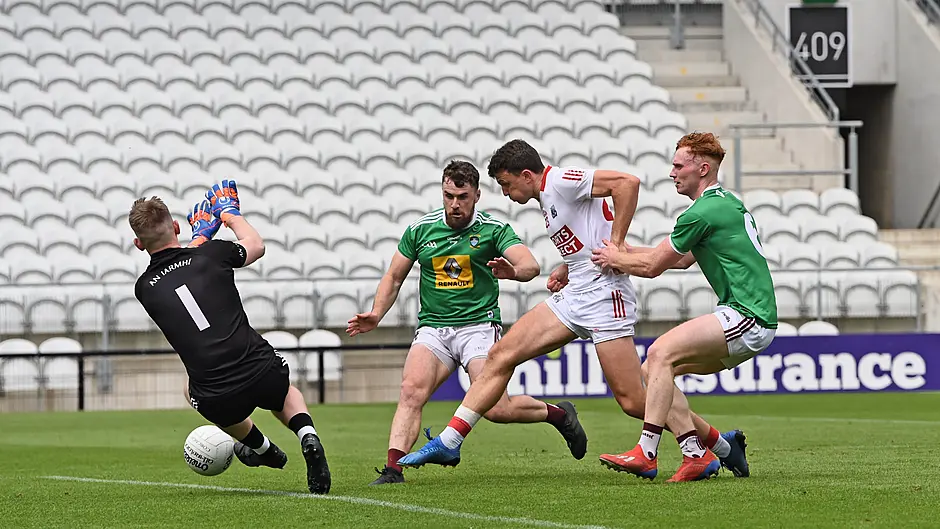BY MICHEÁL O'SULLIVAN
THANK you, Dublin. The emphasis on attacking football is finally taking precedence over the blanket defence and our game is really becoming the spectacle it deserves to be.
The blanket defence was first perfected by the northern teams and it filtered down through the ranks across the whole country as a method of smothering the opposition’s forward play.
Managers across the length and breadth of the country spent endless hours looking for the key to unlock this tactic. It wasn’t until the Jim Gavin-led blue wave that is Dublin started ripping apart the defensive efforts of overly-negative teams that managers started to realise that the only way to compete with them is to go toe to toe on the scoreboard using a more balanced offensive/defensive mix.
The spectacle of attacking football that we saw across all the Allianz Football League games last weekend is surely the proof in the pudding. A combined seven goals and 29 points in the Kerry v Tyrone Division 1 semi-final translates into a score every two minutes. Two goals and 32 points in the Dublin v Donegal clash gives roughly the same time-to-score ratio. In the past these kinds of tallies were only achieved in hurling matches that were described as classics.
Dublin’s pretenders to the throne seem to feel that attacking the Dubs and trying to outscore them is the way to knock them off their pedestal. All of us are hoping that this type of attacking football will filter its way down to club level as quickly as the over-emphasis on defence did.
The shortened league has been a great advertisement for the game, but one thing I would love to see being dumped before the championship starts is the advanced mark and its equivalent, the defensive mark. There is nothing that will bring a crowd to its feet quicker than to see a top-class forward win a ball in front of his man, turn, take him on, skin him and stick it in the back of the net. Equally, an inside back fetching a ball over his head, landing, breaking the tackle and making a quality delivery has the effect of rising his team-mates around him. The advanced mark is taking from the entertainment value and slowing the game down.
In rugby they have changed the rules time and again to prevent opposition players slowing down the ball and in an attempt to speed up the game. Instead we have adopted a rule from the game Down Under which does not make our game better. In Páirc Uí Chaoimh last Saturday, as Cork beat Westmeath in the Division 2 relegation play-off, there were three very good examples of what I am referring to. Early in the game, Daniel Dineen – the Cill na Martra forward had a fine game, scoring 0-3 on his first league start – gathered a beautiful cross-field pass from Luke Connolly and instantly his fist went up in the air, the mark was called, set shot and point. Dineen was one-on-one with his marker and under the old rules we would probably have seen him side-step his man and stick it in the net.
The far more reputable John Heslin of Westmeath took a great mark overhead early in the second half. Mark called, set shot, score. Surely it would be better for the game and more of a spectacle to see him swivel and knock it over from play? Mark Collins, after his introduction, took a high ball from a Paul Walsh delivery. Again, the mark was called, whereas if he had to keep going he was through on goal and could have scored or created an opportunity for a team-mate.
Promotion, relegation and the retention of league status was what was being fought for across all the games last weekend. Leagues were arranged with the possibility of not being able to play a final and finish the competition properly. Covid taken into account, where else would you get such a scenario? Only in the GAA. Players would rather play week on week than train and yet the weekend before was left free. Not good for the optics for the game, particularly when two thirds of the counties’ chances of winning something end with the league.
Preservation of their Division 2 status was what Cork were fighting for recently in Páirc Uí Chaoimh when they hosted Westmeath. On a balmy day substitutions and goals were going to decide the winner and so it turned out. Cork had to dig deep to see off Westmeath in a game that produced 50 scores and all-out attack, end-to-end football.
Cork’s scoring flurry in the third quarter – they outscored Westmeath by 2-5 to 0-5 – put daylight between the teams for the first time in the Rebels’ favour. Brian Hurley showed his value to this Cork team with a match-winning goal and four points with his club-mate Mark Collins contributing a further 1-1, both men sprung from the bench.
Cork improved again in this game. They scored 3-16 from play, and 3-22 in total. They did well on their own kick-out, again mostly as a result of going short. But the stand-out improvement in this game was the creation of regular goal chances, mostly because of Luke Connolly’s ability to pick out inside players with some cracking foot passes.
I wrote earlier in this article about the top teams playing a far more attack-minded brand of football but they still have that defensive balance to their game. Cork conceding 0-25 against Westmeath is a major worry with the Munster championship only around the corner. The defence regularly looked at sixes and sevens when the Westmeath attack ran at them. They missed three one-on-one goal chances at vital times. There were a lot of soft shoulders and shadowing going on with a serious lack of contact from the Cork rearguard. The graph is still rising for this Cork team but Ronan McCarthy and his backroom team need to invest in a few very wide gates to help fill the gaps in a wide open defensive set-up.










